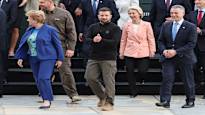According to the survey, Europeans do not believe that Ukraine will win the war, but still support increasing arms aid. Ukraine wants a better position in the peace negotiations.
BRUSSELS Ukrainians believe they will defeat Russia on the battlefield. However, the majority of Europeans think that the war will end with a negotiated solution. This is also the opinion of the British, Poles and Swedes, who are the strongest supporters of Ukraine.
Although faith in Ukraine’s victory is waning, Europeans are widely in favor of increasing arms and ammunition supplies to Ukraine.
European views The European Council on Foreign Relations (ECFR) think tank asked about the war in Ukraine. More than 19,000 people from 15 countries answered the survey in May. Finland was not involved.
Ukrainians want weapons to win the war, but Europeans have a different view.
Investigator Ivan Krastev states in the report’s announcement that by sending weapons and financial aid, the Europeans want to strengthen Ukraine’s negotiating positions in ending the war.
However, the majority of Europeans are not ready to invest more in defense spending. The citizens are also very unanimous that troops should not be sent to Ukraine.
The majority of Ukrainians believe in victory, especially if the West supplies more weapons and ammunition. About a third think that the war will end as a result of the negotiations.
Europeans’ faith in Ukraine’s ability to cope is only slightly improved by increasing arms aid.
The war divides the Europeans into three groups. Estonians and Swedes especially support the continuation of the fighting. Half or slightly less of the citizens of Poland, Britain and Portugal also want Europe to support Ukraine in regaining the territories occupied by Russia.
On the other hand, in Bulgaria, Greece and Italy, more than half of the respondents would like Europe to refer Ukraine to peace negotiations with Russia.
In other countries, the respondents are split in two. For example, in France, one in three supports the continuation of the war, but slightly more for peace negotiations.
President Emmanuel Macron has begun to support the war more and more enthusiastically, at least in his speeches, but the people have not followed suit, the study states.
In contrast, almost one in three French people believe that Russia is at war with France. Sleepwalking into war is more worrying than calming the situation down.
He may come to power after next Sunday’s elections Marine Le Pen A national coalition that would like to reduce aid to Ukraine.
“Finnishing” is not an option
According to researchers, the difference can also be seen in the attitude towards NATO and EU membership. Ukrainians see membership as a reward for winning the war. In Western countries, on the other hand, membership is discussed more as part of a negotiated solution.
The Ukrainians were asked about putting the unpleasant peace terms in order.
70 percent of Ukrainians do not choose NATO membership if the price is the loss of territories occupied by Russia.
In the second option, 45 percent would accept part of the territorial losses, as long as the country retains sovereignty, so that the country retains its own army and the freedom to choose its allies such as NATO or EU membership.
Only 26 percent consider it most important to return the territories, if the conditions were demilitarization and the prohibition of alliances.
Another researcher who prepared the report Mark Leonard assesses in the research bulletin that the major challenge for Western leaders is to mediate between the Europeans and Ukraine on how the war will end.
– While the Europeans mostly consider a negotiated solution to be a likely outcome, the Ukrainians are not yet ready to cede territory in order to gain NATO membership, and they do not accept “Finnishization”, where they would be allowed to keep their territory but give up access to EU and NATO membership, Leonard states in the report.
In general, it has been feared that Russia will attack another European country if it gets a favorable result in Ukraine. Among the citizens, an attack is not considered probable, but possible.
In the opinion of both Ukrainians and others, the greatest limitation to Ukraine’s success is Russia’s military strength.
Ukraine’s EU membership is most supported by respondents from Portugal, Estonia, Sweden, Spain and Poland. The respondents from Germany, Bulgaria, the Czech Republic and France are the most skeptical.
Almost two-thirds of Ukrainians consider EU membership as important to their country as joining NATO.
